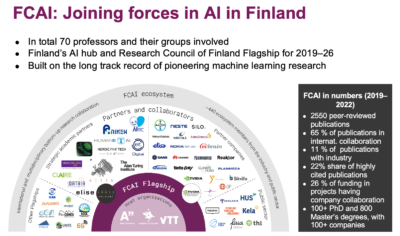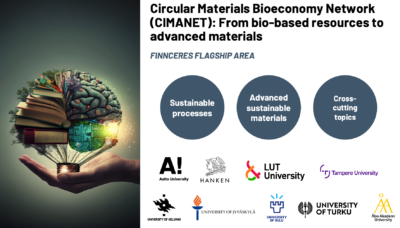25 April 2024
The doctoral pilot: a catalyst of change
learnings from the webinar hosted by MEX Finland, Synocus, and Aalto University on 26.3.2024
The Ministry of Education and Culture will allocate EUR 255 million to universities for piloting new practices in doctoral education in 2024–2027. This additional funding will be allocated to 1,000 doctoral researchers who will have a three-year employment contract to complete their doctoral degree. The aim of this new doctoral education pilot is to create the right conditions for innovation, drawing on research-based data, and increase the number of people with a doctorate working in the private sector, for businesses. This pilot should also spur the mobility of doctoral graduates between universities, businesses, research institutes, and other organizations.
MEX Finland, Synocus, and Aalto University co-organized on March 26th, 2024 a webinar sharing the insights of Aalto professors on how the new program can support industry. The webinar also opened up a dialogue on how companies and universities in general could collaborate more fruitfully in the future.
Aalto University has taken the lead in facilitating a more active dialogue between researchers and companies about how the doctoral pilot can strengthen industry-university collaboration. In the March webinar, Aalto University provided a very insightful overview of the opportunities of the new doctoral program in presentations by Mikko Kosonen, Chair of the Board, Jyri Hämäläinen, Vice-President, Research, Janne Laine, Vice-President, Innovation, Outi Toijala, Head of Corporate Relations, and Professors Arno Solin and Monika Österberg, who are leading Flagship research programs at Aalto University.
Aalto University’s research is guided by a mission-driven approach. Cross-pollination between universities and companies, between large and small companies, and cities and the public sector is key for successful implementations. Through collaboration, it is possible to reach the ambitious national goals and make the necessary tiger leaps enabling a Finnish viability advantage. Aalto University is recruiting 178 new doctoral students for 11 pilot consortiums and is actively looking for industry mentors and research partners for these students to strengthen the collaborative networks between industry and research.
Examples of the opportunities offered by the doctoral program
 Two example areas for doctoral study collaboration were presented. The first was about the opportunities in Artificial Intelligence by Professor Arno Solin, the AI-DOC-consortium leader at Aalto University. The FCAI (Finnish Center for Artificial Intelligence) a flagship program that is hosted by Aalto University, the University of Helsinki, and VTT, is the national basis in this research field upon which three main initiatives are based: the ELLIS Institute, the House of AI and the AI-DOC National Doctoral School. The ELLIS is a pan-European AI network of excellence to secure Europe’s sovereignty in AI. Currently, a few of the 40 European ELLIS units will be expanded into ELLIS Institutes that will have a key role within the network. Locations for these institutes are selected now, Finland as a possible location is looking for more Industry interest to support their strength as an Ellis Institute candidate. Those interested in supporting this can sign a statement of support on their webpage.
Two example areas for doctoral study collaboration were presented. The first was about the opportunities in Artificial Intelligence by Professor Arno Solin, the AI-DOC-consortium leader at Aalto University. The FCAI (Finnish Center for Artificial Intelligence) a flagship program that is hosted by Aalto University, the University of Helsinki, and VTT, is the national basis in this research field upon which three main initiatives are based: the ELLIS Institute, the House of AI and the AI-DOC National Doctoral School. The ELLIS is a pan-European AI network of excellence to secure Europe’s sovereignty in AI. Currently, a few of the 40 European ELLIS units will be expanded into ELLIS Institutes that will have a key role within the network. Locations for these institutes are selected now, Finland as a possible location is looking for more Industry interest to support their strength as an Ellis Institute candidate. Those interested in supporting this can sign a statement of support on their webpage.
The House of AI is coordinating multidisciplinary research for applying and developing AI at Aalto University. The research themes are carefully selected: A strong potential for transformative AI; new possibilities for excellence & impact; more industrial cooperation and SME groups; an impact on sustainability and a competitive advantage for Aalto University.
The Finnish Doctoral Program Network in AI (AI-DOC) includes 10 Finnish Universities and offers 6 different themes and application areas for research in AI: Fundamental AI, AI in Comms and Signal Processing; AI in Health; AI in Engineering; AI in Language and Speech Technology and AI in Society and Business. All of these themes include several universities.
 The second example was presented by Professor Monika Österberg, of the School of Chemical Engineering at Aalto University and leader of the FinnCERES Flagship program and its CIMANET consortium. FinnCERES is the materials bioeconomy Flagship, a joint effort by Aalto University, VTT, and the Academy of Finland. The main themes within this are to build a solid foundation for Future Biorefineries, including Lignin valorization and the work on novel fractionation technologies. Waste Water purification and Bio-based membranes and filters are the priorities in the Clean Air and Water Theme. The theme Lignocellulosis Beyond Plastics includes textile post-treatments, and Composites and packaging implementations. The theme of Electronics, Optics, and Energy Applications is working on bio-based optical fibers and biochars for energy applications. The fundamental research of this flagship is in Interactions and advanced characterizations.
The second example was presented by Professor Monika Österberg, of the School of Chemical Engineering at Aalto University and leader of the FinnCERES Flagship program and its CIMANET consortium. FinnCERES is the materials bioeconomy Flagship, a joint effort by Aalto University, VTT, and the Academy of Finland. The main themes within this are to build a solid foundation for Future Biorefineries, including Lignin valorization and the work on novel fractionation technologies. Waste Water purification and Bio-based membranes and filters are the priorities in the Clean Air and Water Theme. The theme Lignocellulosis Beyond Plastics includes textile post-treatments, and Composites and packaging implementations. The theme of Electronics, Optics, and Energy Applications is working on bio-based optical fibers and biochars for energy applications. The fundamental research of this flagship is in Interactions and advanced characterizations.
The Circular Materials Bioeconomy Network (CIMANET) research themes and doctoral training activities are targeted to meet the current and future needs of the society and bio-based industries and ensure a smooth transfer and employment of graduates in a wide range of sectors in society through the principle of collaboration. The FinnCERES flagship has been especially successful in fostering collaboration with the Veturi programs of Valmet (Beyond Circularity), Fortum & Metsä Group (ExpandFibre), and Mirka (SHAPE), demonstrating excellent interaction between industry and research and providing a good model for the upcoming programs. finnceres.fi
Leaping in the right direction together
The strong government support for intensified industry-research collaboration offers a unique opportunity to take collective capabilities and skills to a new level and to generate breakthrough innovations, new markets, and solutions. In addition to that, there are constantly new deep-tech start-ups being created that will benefit from more active collaboration with the industry. This will accelerate research commercialization which also will provide value to business ecosystems established by Veturis and other research-driven companies. Research projects and deep-tech start-ups, in turn, will gain scaling benefits from cooperation with industrial leaders.
In its efforts to support joint capability building on an ecosystem level, Synocus, in collaboration with MEX Finland is now looking for companies that are interested in co-creating the springboards facilitating future tiger leaps. We will take an excellence-driven approach aiming to simultaneously develop excellence in four domains to enhance learning and intensify collaboration: process excellence, offering excellence, innovation excellence, and societal excellence.
Any company interested in taking part in the development of a common action plan around these springboard candidates is encouraged to be in touch so that we can jointly create something that will help Finland return to the growth path we so desperately need. Please contact Niklas Koski (niklas.koski(at)synocus.com) for more information.